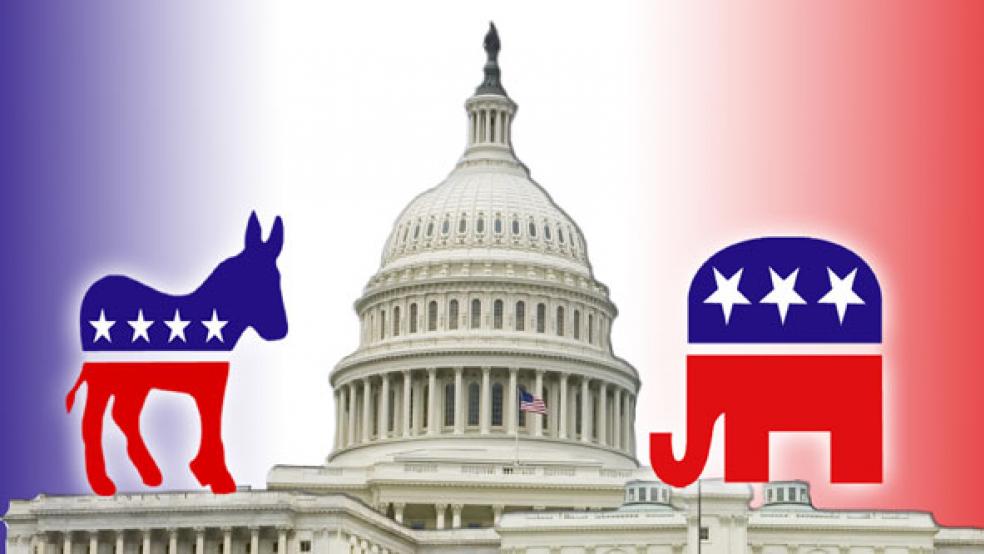These are tough times for President Obama and the Democrats.
Republican David Jolly, a former Washington lobbyist, won a closely watched House special election in Florida on Tuesday after relentlessly hammering away at Obamacare – a win that’s a bad omen for other Democratic candidates across the country. Add to that an NBC News-Wall Street Journal poll just out showing Obama’s approval rating at an all-time low of 41 percent, suggesting Democrats may be facing strong political headwinds less than eight months before the November midterm elections.
Related: Obamacare Mess Defines GOP 2014 Campaign Strategy
Obama’s job approval dipped from 43 percent in January for a new low. Some 54 percent of respondents disapproved of the job he’s doing, matching a previous high from December, when the botched rollout of his signature health care law dominated the news. The latest survey also showed the lowest-ever approval in Journal/NBC polling for Obama’s handling of foreign policy amid turmoil and civil war in the Middle East and Ukraine.
Even more troubling for many Democrats facing tough races in the House and Senate this year, perhaps is that 33 percent of those polled said their vote this fall will signal opposition to the president as much as their attitudes about the candidates. Moreover, 48 percent of voters say they’re less likely to vote for a candidate who is a solid supporter of the Obama administration, compared with 26 percent who say they’re more likely to vote for that candidate.
“The wind is in our face,” said Democratic pollster Fred Yang of Hart Research, who conducted the survey with Republican pollster Bill McInturff. “There is an advantage for Republicans right now.”
McInturff agreed this will be “a very difficult year for Democrats” who are battling to retain control of the Senate and reduce the GOP’s majority in the House.
Related: Americans Want to Fix, Not Repeal, Obamacare
“The president is being taken off the field as a Democratic positive,” McInturff said in a statement. “These numbers would suggest that, beyond his behind-the-scenes fundraising, it’s hard to imagine the president on the road and hard to imagine where he would campaign.”
Obama sounded the alarm for his party on Tuesday during appearances at two high-dollar Democratic fundraisers in New York City, according to The Washington Post. The president has made the midterm elections a top priority and is reminding Democrats of the risks they run this year if they don’t show up in full force.
“In the midterms, Democrats too often don’t vote,” he said last week at a Democratic National Committee event. “Too often, when there’s not a presidential election, we don’t think it’s sexy, we don’t think it’s interesting.”
Republicans hold a one-point advantage over Democrats on the question of which party that registered voters prefer to control Congress, 44 percent to 43 percent, according to the NBC-Wall Street Journal survey. While that’s within the poll’s margin of error, Republicans have traditionally fared well in elections when they’ve held a slight lead on this question.
Jolly’s victory on Tuesday in Florida’s Gulf Coast district offered the first important test of voter attitudes this year. The race drew almost $9 million in outside spending on an avalanche of attack and counter-attack ads that road-tested important national issues, including health care. Voters narrowly chose Jolly over Alex Sink, Florida’s former chief financial officer and the Democrats’ 2010 gubernatorial nominee.
Jolly won 48.4 percent of the vote to 46.5 percent for Sink and 4.8 percent for Lucas Overby, a third-party Libertarian candidate endorsed by Sen. Rand Paul (R-KY).
Related: GOP Congressional Committee Backs Off Tea Party Conflict
The special election filled a House seat left vacant by the death last fall of veteran Republican Rep. C.W. (Bill) Young, a one-time chairman of the Appropriations Committee. The 13th congressional district, which includes part of the St. Petersburg area, is considered a swing district that is heavily populated by white, older, and more Republican voters.
By many accounts, Jolly – a one-time congressional aide to Young – ran a lackluster campaign and trailed Sink in some polls. But he prevailed on Tuesday after making the repeal and replacement of the Affordable Care Act a central focus of his campaign.
Republicans rejoiced over the victory and signaled that Obama and his troubled health care law would be a recurring theme later this year on the campaign trail.
Speaker John Boehner (R-OH) called the Republican victory in a Florida special election a “big win” and said Obamacare will become more toxic to voters as time goes by. “More people are going to lose their policies over the next couple years, people are going to pay a lot more for the policies they’re going to have to buy at the exchanges, it’s going to get a lot worse before it gets better,” he said.
Rep. Greg Walden (R-OR), chairman of the National Republican Congressional Committee, told MSNBC today that Obamacare “is an underlying issue everywhere because of what it’s doing to the economy” and because of the additional government intrusion in people’s lives. Walden noted that while Obama’s approval rating is currently at 41 percent in national polling, it is in the range of 20 percent in some Democratic districts that have been targeted by the GOP – including the district of Democratic Rep. Nick Rayhall of West Virginia.
“This is a horrible year for Democrats coming up,” Walden said.
This article was updated at 3:56 p.m.
Top Reads from The Fiscal Times:





